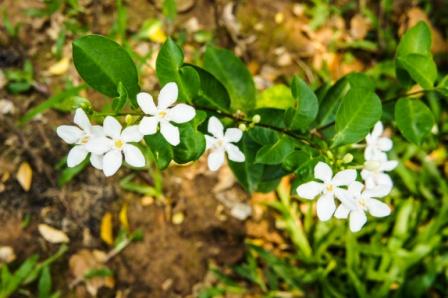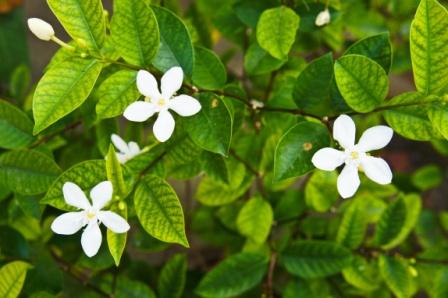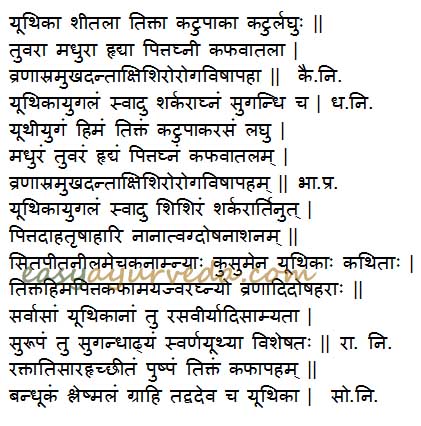Yuthika Jasminum auriculatum: Benefits, Remedies, Research, Side Effects
Yutika (Juhi) – Jasminum auriculatum is a herb mentioned in Ayurveda for the treatment of burning micturition, treatment of wounds, diseases of the oral cavity, headaches and poison cases.
Latin name- Jasminum auriculatum Vahl.
Family- Oleaceae

Table of Contents
Vernacular names
Names in different languages:
Hindi name- Juhi
English name- Jasmine
Kannada name- Mallige
Tamil name- Malligai
Telugu name- Malle puvvu
Sanskrit synonyms
Synonyms:
Sumana- The flowers relax the mind
Vasanthi- The flower Blooms in the vasantha season
Punyagandha, Jati, Yuthika, Bala, Balapushpa, Gunojwala, Kandi, Charumoda, Shikhandini, Pushpagandha,
2nd type, yellow flower (Kaiyadeva Nighantu):
Swarnayuthika, Peetika, Peeta Yuthika, Hemapushpi, Peetapushpi
Classical categorization
Dhanvantari Nighantu- Amradi varga
Bhavaprakasha- Pushpa varga
Kaiyyadeva Nighantu- Oushadhi varga
Raja Nighantu- Karaveeradi varga
Shodala Nighantu- Amradi varga

Morphology
Yutika is a plant cultivated all over India especially in Uttar Pradesh and Tamil Nadu for the commercial use of the flowers. The flowers are white in color giving good, pleasant fragrance.
Properties, part used, dosage
Properties:
Rasa (Taste) – Tikta (Bitter), Kashaya (Astringent)
Guna (Qualities) – Laghu (Light for digestion)
Vipaka – Katu (Undergoes Pungent taste after digestion)
Veerya (Potency) – Sheeta (Cold)
Karma (Actions) – Pitta shamaka (reduces the vitiated Pitta dosha)
Part used- Root
Dosage- Decoction- 50 to 70 ml
Chemical constituents
The leaf of the plant contains lupeol, hentriacontane and n- tricantanol, jasminol, d- mannitol and jasmine. The flower buds contains indole, benzyl acetate and methyl anthranilate.
Uses, Sanskrit verse
Uses of Yutika:
- The decoction prepared from the roots of Jasminum auriculatum is given in a dose of 50-60 ml to treat burning micturition and renal calculi.
- The paste prepared from the root and leaf of the plant is applied locally over the wound to treat it.
- The cold infusion of the roots and leaf is used for gargling in the diseases of the oral cavity, looseness of the gums.
- The paste of the root of the plant is applied over the forehead to relieve headache and burning sensation of the eyes.
- The perfume extracted from the flowers is used commercially.

Hrudya – acts as cardiac tonic, congenial for heart
Indications
Indications as per Ayurveda:
Vrana – Ulcers, wounds
Asra – blood disorders such as abscess, skin disorders, bleeding disorders such as menorrhagia, nasal bleeding etc.
Mukharoga – oral disorders
Dantaroga – teeth disorders
Akshiroga – eye disorders
Visha – Toxic conditions, poisoning
Daha – burning sensation, as in gastritis, neuropathy, burning sensation in eyes etc
Trushna – excessive thirst
Interaction with medicines, supplements
Can this be used while taking Homeopathic medicine?
Yes. This product does not react with homeopathic medicine.
Can
this medicine be continued while taking supplements like multivitamin tablets,
Omega 3 fatty acids etc?
Yes. Generally, this product goes well with most
of the dietary supplements. However, if you are taking more than one product
per day, please consult your doctor for an opinion.
With western
medicines
Seek your
doctor’s advice if you are taking this product along with other western
(allopathic / modern) medicines. Some Ayurvedic herbs can interact with modern
medicine.
If both Ayurvedic and allopathic medicines are advised together, then it is
best to take Allopathic medicine first, wait for 30 minutes and then take the
Ayurvedic medicine.
Adverse effects, Research
Adverse effect: No adverse effect is known or reported after the use of Yuthika.
Research articles about Jasminum auriculatum:
Anti- lithiatic effect: The effect of oral administration of aqueous and alcohol extracts of Jasminum auriculatum Vahl (Oleaceae) flowers on calcium oxalate nephrolithiasis has been studied in male albino rats. The increased deposition of stone forming constituents in the kidneys of calculogenic rats was significantly lowered by curative and preventive treatment using aqueous and alcohol extracts. The results indicate that the flowers of J. auriculatum are endowed with anti- urolithiatic activity.
Author: Dr.B.K.Prashanth M.D (Ayu), Ph.D
E mail: drprashanthbk@gmail.com








